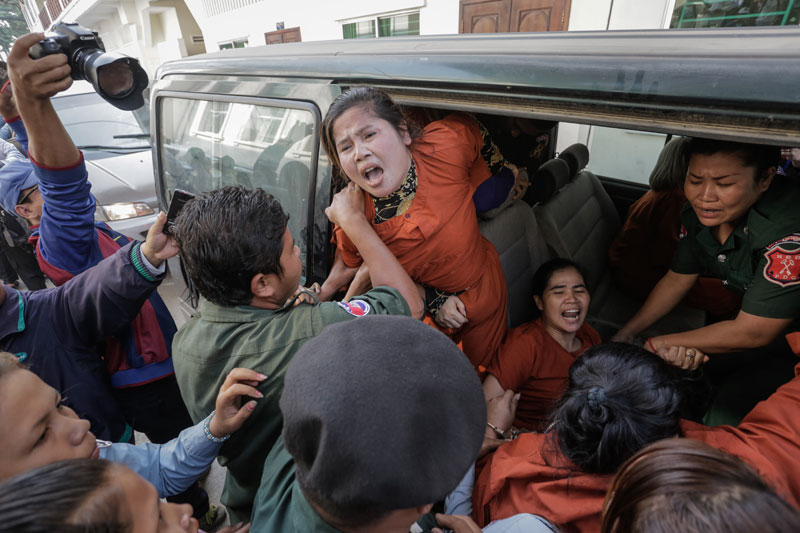The Court of Appeal on Monday upheld the protest-related convictions handed down to 11 activists in November, but reduced the prison sentences of all but the most high-profile members of the group.
Rights groups called the decision “indefensible.”

Seven of the defendants were arrested in mid-November for blocking traffic during a protest in front of Phnom Penh City Hall against the municipal government’s failure to address the repeated flooding of their Boeng Kak neighborhood. The other four were arrested the next day for “obstructing public officials” while protesting outside the Phnom Penh Municipal Court against the arrest of the first seven.
The municipal court convicted all 11 in quick succession and sentenced each of them to a year in prison. Rights groups condemned the trials, which they said were politically motivated and intended to silence anti-government dissent.
On Monday morning, the Court of Appeal upheld the original verdicts against the 11 activists and the one-year prison sentences for the most prominent defendants—anti-eviction activist Tep Vanny and former monk Soeung Hai, who was defrocked over the case.
The other nine had their sentences reduced by between two and six months on the grounds that they were either sick, old or had young children to care for, leaving all 11 with time left to serve. Except for Mr. Hai, the court also reduced the original 2 million riel (about $500) fines for the activists to between 1 million riel (about $250) and 1.5 million riel (about $375).
The court, Presiding Judge Nguon Im said, decided “to uphold the verdict of the Phnom Penh Municipal Court as valid.”
During their appeal hearing last week, the seven activists arrested in front of City Hall confessed to dragging a bed frame onto Monivong Boulevard to illustrate the fact that their homes were inundated with filthy water because the government had not built them an adequate drainage system.
But Judge Im said Monday that he was unconvinced by their claims that the stunt had not affected traffic.
“It was not right that they stood in the street. They could have stood somewhere else. Standing in the middle of the street causes traffic jams,” he said.
During their own appeal hearing last week, the other four activists all denied obstructing officials in front of the municipal court. Mr. Hai, the defrocked monk, said he was attacked by government security guards while trying to take photos of a scuffle that broke out between them and protesters.
Judge Im said he was unmoved.
“Soeung Hai, the monk, who people believe in and respect, committed a crime and acted contrary to Buddhist principles, so we cannot reduce his sentence,” he said.
A brief fracas ensued inside the courtroom after the judges announced their decision and the activists refused to heed their orders to stay quiet. Security guards bundled them out of the room, some by their hands and feet.
During the announcement, about 300 people protested outside the courthouse demanding that the judges acquit the 11 activists.
After hearing the court’s decision, Uk Vichea, Ms. Vanny’s husband, said the judges were doing the government’s bidding.
“The court is under the influence of the government,” he said. “If it followed the law, it would have released them. The court wants to break my wife’s spirit so she doesn’t protest against the government anymore, but it won’t work because she is strong and brave.”
Ms. Vanny has been at the forefront of protests against the forced evictions at Boeng Kak for the past several years. The government has forced out some 3,000 families from the neighborhood to make way for a high-end real estate project backed by CPP Senator Lao Meng Khin.
In a joint statement, 36 human rights groups, associations and communities condemned the Appeal Court’s decision and said the government had never managed to prove its case against the activists.
“The Court of Appeal has once again shown that evidence of a crime is not necessary for a conviction in Cambodia. Mere criticism of the government is all it takes to secure a prison term,” Moeun Tola, a program director for the Community Legal Education Center, said in the statement.
The groups accuse the court of failing to conduct a fair trial, repeatedly interrupting the defense lawyers and refusing to let them screen video footage showing that the women who protested in front of City Hall did not actually block traffic. As for the other four activists, the groups say the government’s own two witnesses could not definitively place them at the scene during the original trial and that neither of these witnesses appeared for cross-examination during the appeal hearing.
“Furthermore, neither the judges nor prosecution established that the defendants had committed violence during the protest, a fundamental component of the article under which they were convicted,” they say in the statement.
The groups ask the courts to drop the charges and release the activists immediately.
Lawyers for the activists said all 11 would appeal to the Supreme Court.
The case has attracted the attention of several foreign delegations to Cambodia, some of which sent representatives to observe the appeal hearings last week. The U.N.’s visiting human rights envoy to Cambodia, Surya Subedi, also attended. At a press conference on Friday, the day after the hearings, Mr. Subedi said that a lack of judicial independence remained one of the most pressing human rights problems in the country.



